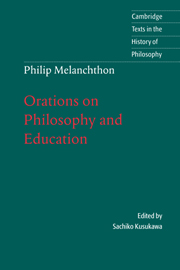Book contents
- Frontmatter
- Contents
- Acknowledgements
- Introduction
- Chronology
- Further reading
- Note on the text
- The scope of education
- The arts course
- The higher faculties
- Authorities
- 24 On Plato
- 25 On Aristotle
- 26 On the life of Galen
- 27 On the life of Avicenna
- 28 On the life of Rudolf Agricola
- 29 On Johannes Regiomontanus
- 30 On Erasmus of Rotterdam
- 31 At Luther's funeral
- Index
- Cambridge texts in the history of philosophy
27 - On the life of Avicenna
Published online by Cambridge University Press: 05 June 2012
- Frontmatter
- Contents
- Acknowledgements
- Introduction
- Chronology
- Further reading
- Note on the text
- The scope of education
- The arts course
- The higher faculties
- Authorities
- 24 On Plato
- 25 On Aristotle
- 26 On the life of Galen
- 27 On the life of Avicenna
- 28 On the life of Rudolf Agricola
- 29 On Johannes Regiomontanus
- 30 On Erasmus of Rotterdam
- 31 At Luther's funeral
- Index
- Cambridge texts in the history of philosophy
Summary
Oration on the life of Avicenna, recited by Doctor Jakob Milich
The entire nature of things is a theatre to be admired, in which God wills that he be beheld and that the distinct testimonies of His presence, wisdom and goodness be considered. Therefore the Architect of great wisdom has employed such a variety of skill in the building, arrangement, shapes, motions and powers that human minds would be forced to acknowledge that this most beautiful work was not blown together by chance, but that there is indeed a constructing mind. And they should conclude with the strongest approbation that men need to be subject to that constructing mind, and that our morals need to agree with that eternal precept which resides in the Maker Himself, who pours the rays of His light into us. And they need to conclude that the Maker is to be worshipped with true praises.
It is evident that the contemplation of nature is necessary for this important reason. Furthermore, we are also moved by our own benefit. Help for life has to be sought in this great variety of things, which are partly nourishment for our bodies, partly remedies. I commend the zeal and counsel of those who, in reciting the praises of the art of medicine, demonstrate in some way that the consideration of nature is pleasant and useful. Nevertheless, the scope of the argument is such that barely a few portions can be plucked from this multitude, and can be set out and demonstrated.
- Type
- Chapter
- Information
- Melanchthon: Orations on Philosophy and Education , pp. 220 - 226Publisher: Cambridge University PressPrint publication year: 1999



